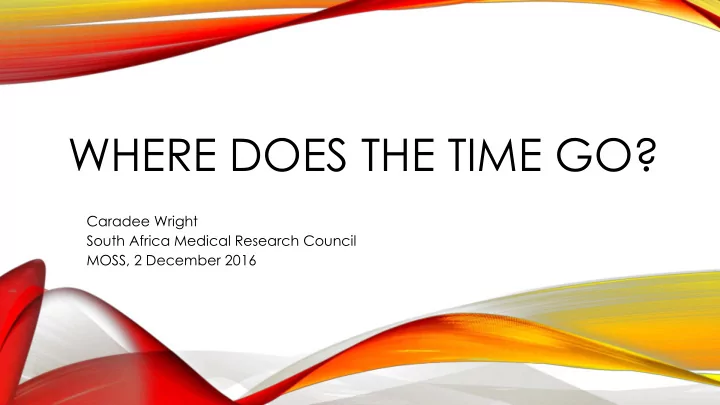

WHERE DOES THE TIME GO? Caradee Wright South Africa Medical Research Council MOSS, 2 December 2016
Doctoral students are like all seven dwarfs at different stages of their program. At first they are Dopey and Bashful. In the middle, they are usually sick (Sneezy), tired (Sleepy), and irritable (Grumpy). However , in the end, they’re called Doc, and then they are Happy (Azuma, 1997). More formally, I have seen students go through four stages, roughly reflecting the four years of typical doctoral study: The Stage of Exploration, The Stage of Engagement, The Stage of Consolidation, and The Stage of Entry.
Grover, V. 2007. Successfully navigating the stages of doctoral study. Int J Doctoral Studies, Vol 2, 1-13.
AUDIT YOUR TIME • The planning fallacy: • Overestimating time for short tasks and underestimating time for long tasks • Not planning for the basics • Track your time for a week, include showering, sleeping, grocery shopping, cooking, reading, writing, emailing etc.
FIND WHAT WORKS BEST FOR YOU • Experiment with different time schedules
ESTABLISH BRIGHT LINES • Honour your schedule as if it’s set in stone
ATTITUDE FOLLOWS • Just get started
GET A LITTLE HELP FROM YOUR FRIENDS • Be kept accountable
USE SMALL CHUNKS OF TIME WISELY • “15 minutes is not enough time to do anything” 15 minutes = 15 minutes 15 minutes = 900 seconds
USE TECHNOLOGY TO AVOID DISTRACTION • Social networking and email checking are a procrastinator's best friend. • Productivity tools: Leech Block, Google's StayFocused or Apple's Focusbar app.
ABANDON PERFECTION • If a task is not crucial to your realm of study, give it a time limit and then stop
REWARD YOURSELF • Incentives so you stay motivated
Recommend
More recommend